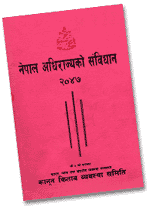 It has not been easy to explain Nepal's return to war to people outside the kingdom. My editors, for example, at various publications and broadcast outlets around the world, want to know why the ceasefire between Maoists and government broke down. This is a crucial question at the heart of the type of journalism I like to practice. Why did it happen?
It has not been easy to explain Nepal's return to war to people outside the kingdom. My editors, for example, at various publications and broadcast outlets around the world, want to know why the ceasefire between Maoists and government broke down. This is a crucial question at the heart of the type of journalism I like to practice. Why did it happen? "Well," I tell them, "the Maoists wanted a constituent assembly and the government didn't." End of story. Back to bloodshed, fear and a clouded future for Nepal. "Hang on," they say, in various ways, "doesn't Nepal already have a constitution?" Yes, I explain, it does. Long silence down the telephone line, followed by, "But, surely a country with a constitution doesn't need a civil war to produce another one, or amend what they've got. Surely all you do is lock a bunch of lawyers and experts and politicians in a room until they draw something up? You don't need a war."
That, my friends, is the view from points west and east, from those who take my journalism. I can't for the life of me understand why Nepal is once again at war because of a constituent assembly. So important was this putative gathering to two groups of negotiators-one hardened rebel ideologues and warriors, the other pragmatic veterans of Nepali recent political history-that neither could come up with a form of words to keep the country at peace.
For that is what a constitution is, a form of words, a document, a contract between rulers and ruled, supervised by lawyers, courts and activists, of paramount importance to democracy. But a form of words nonetheless. And as such, subject to change by consensus, negotiation or popular demand. Perhaps even by constituent assemblies. By implication, this is the notion at the heart of constitutional democracy. It seems to me then, that what you had at the last negotiating session of government and Maoists was an agreement on the fact that Nepal is a constitutional entity, a country where the deal between the people and the rulers is a matter of mutual agreement.
No country in the world holds its constitution in higher esteem than the United States of America. The document agreed among an 18th century collection of lawyers, activists and experts is still a shining example of the genre, emulated by-among others-those who drew up the constitution of India in 1953 and Nepal in 1990. Yet the Americans don't see the words of their founders as sacred, inviolate, never to be tampered with or changed. No indeed, The Constitution of the United States of America has been amended as per the process agreed by its authors, a grand total of 27 times. This was achieved-as per the constitutional requirement-with the support of two-thirds of Congress and ratification by three-quarters of state legislatures. Checks and balances, the notion that makes America's constitution work. Mind you, not all of the 27 agreed changes made perfect sense, or any sense at all for that matter.
Infamously, in 1919, the United States Congress-if you like, the permanent Constituent Assembly of the country-passed the nineteenth amendment, the banning of alcoholic drink from American life. It took, as required, a two-thirds majority in both houses of Congress, significantly less than the percentage of congressmen that drank alcohol regularly. But the amendment passed nonetheless, only to be repealed, by a much thirstier congressional majority some years later.
The point is not to speak out for the American system, or a constituent assembly or even the present constitution of Nepal. It's to say that surely avoiding war is the prime concern of peace negotiators. From both sides. The Maoists, it seems, returned to war for want of a form of words. The government side was unable to come up with one. Both sides bear responsibility for the fear and violence at large in the country today.
And it's all because they couldn't find a way to agree on words. It's no consolation to those Nepalis suffering at the moment that history will not look kindly upon such developments-or upon the men behind them. Let's just hope both sides rediscover the power of words, and quickly.



